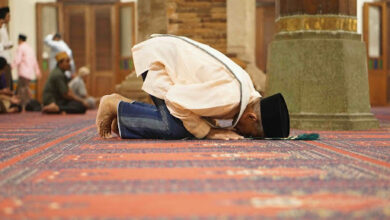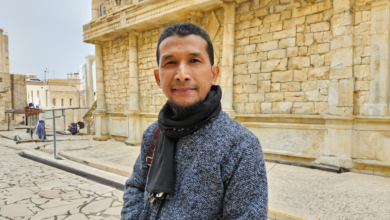
DDHK.ORG - Know, O thalib (claimant of knowledge) that religion consists of two parts. First, leave immorality. Second, work on obedience.
Giving up immorality is harder to do than doing obedience because doing obedience is fun to be done by everyone. But leaving lust (immoral) can only be carried out by the shiddiqin (righteous people).
Therefore Messenger of Allah SAW said:

Meaning: "People who emigrate are actually people who emigrate from evil (leaving evil). And the real mujahid are people who fight their passions. "
Leaving the Immorality of the Mind (the Immorality of the Heart)
Know that there are so many reprehensible qualities in the heart. Cleansing the heart from this defilement requires constant effort.
While treating it has been very difficult and has lost knowledge and charity (which must be followed to cleanse the heart), it is because people have forgotten it and they are too busy with accumulating world jewelery. We have mentioned everything related to this issue in the book lhya Ulumiddin in the section that talks about Al-Muhlikat (Things that lead to someone's destruction) and in the section that talks about Al-Munjiat (things that need to be followed for salvation) .
However, here we try to mention three things of a very evil heart, which is a characteristic that is commonly seen among scholars who exist today, so that you can stay away from it because these qualities can lead to self-destruction and are the peak. for some reprehensible traits. These characteristics are hasad, riya, and ujub.
So be serious in cleansing your heart of the three characteristics, because when you can clean your heart from it, you will be able to
know ways to keep away from other vicious qualities. But if you are not able to purify your heart from it, then you are even more incapable of facing other qualities.
Do not think that if you have good intentions in reciting knowledge, it means that you are saved from everything that is dangerous, while in your heart you still have the characteristics of hasad, riya, and ujub.
In this case Rasulullah SAW said:

It means: "There are three qualities that can destroy a person; hunks to obey, lust followed, and feeling proud of oneself. "
First: How to leave the nature of hasad
This hasad nature is a branch of the nature of hunks, because a person who is hunks is someone who does not want to give something that is in his hand to others. And sahih (very hunksy) are people who do not want to see God's gifts poured out on anyone from God's servants. So this sahih is more evil than hunks.
A person who hasud is a person who has objections to Allah pouring out favors and gifts on one of God's servants. Whether the blessings are in the form of knowledge, wealth, human love, or what are the advantages that Allah gives to His servants. This person who hasad hopes that Allah's blessings will be lost to others, even though he does not get any benefit from the loss of this blessing. Then the nature of this hasad is an extraordinary crime.
Therefore, Rasulullah SAW once said:

Meaning: "The nature of hasad consumes the reward of goodness, like fire eats firewood."
The person who hasad is actually always far from affection and is always in torment in this world and in the hereafter. In this world he is tormented with emotional stress, because Allah always pours out his gifts to many people. In fact, it was to the hasad's friends that he recognized them.
When Allah devotes the blessings of knowledge, wealth, and position to others, the person who hasad is always in torment when he sees Allah's mercy towards others. So that was the situation until the end of his life.
In the hereafter, it is even more terrible, because a servant will not reach the essence of faith as long as he has not loved all the Muslims, as he loves himself. In fact, it should be with the feelings of all Muslims, both in pleasure and in distress.
Because Muslims are like a building, where one part strengthens the other.
المُؤْمِنُ لِلْمُؤْمِنِ كَالْبُنْيَانِ يَشُدُّ بَعْضُهُ بَعْضًا
Muslims also like bodies. If one member of the body feels pain then that suffering is felt by all the other members of the body.
مثل المؤمنين في توادهم وتراحمهم وتعاطفهم مثل الجسد إذا اشتكى منه عضو تداعى له سائر الجسد بالسهر والحمى
So if you find your heart is not in a state like this, then (the nature of hasad is still in your heart and) you should try to clean it. Because your efforts in leaving this heart disease are more important than you busy yourself to deepen the science of furu '(a non-essential branch of fiqh) and deepen the problems that the scholars neglect.
Second: How to leave the riya nature
As for riya, that is what is called "shirk khafi", one of the two parts of shirk. (Shirk is divided into two: First, shirk khafi (cryptic shirk), which is riya. Second, shirk jali (clear shirk, namely shirk worshiping idols).
That is, you seek respect in the human heart, so that by doing so you can achieve rank and greatness. Love for rank and position is included in the term "Hawan Muttaba", the indulgence of lust.
With this riya disease many people perished. So no one destroys humans except for himself. If humans want to think about the nature of their actions, of course they know that most of the knowledge they have and the habits they practice culminate in the urge to show it to others. Objectives like this can eliminate the reward of practice.
As mentioned in the hadith:

Meaning: “Surely there are people who have been martyred who will be thrown into the fire of hell on the Day of Resurrection. Then he was amazed and complained to Allah, saying: O my Lord! Haven't I been martyred in defense of Your religion? Allah answered: (No) Actually, you are capable of being martyred so that you are said to be brave. And so it was said to you. Then that's your reward. "
This is the same way it is said to people who are pious, hajj, and reciter (who they celebrate in their deeds).
Taken from the book translation of the book Bidayatul Hidayah / The Beginning of the Way of Hidayah by Al Imam Hujjatul Islam Al Ghazali ra [DDHK News]



